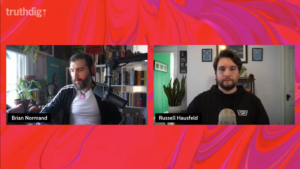Corporadelia is Knocking at Psychedelia’s Door
A conversation with psychedelic activist David Nickles about “Non-Prohibitionist Critique” and the dangers of right-wing appropriation of experimental drug treatments. Psychedelic Jeep. Photo: Sergei F / Flickr / CC BY 2.0
This is Part of the "The Ecstasy of Agony" Dig series
Psychedelic Jeep. Photo: Sergei F / Flickr / CC BY 2.0
This is Part of the "The Ecstasy of Agony" Dig series
David Nickles has emerged as a prominent voice in the debate over the increasingly busy intersection of capitalism and psychedelic drugs. An early critic of the Multidisciplinary Association for Psychedelic Studies’ (MAPS) strategy to court the military and the right-wing, Nickles wrote a polarizing 2020 piece about the organization’s support of the military and the police in the wake of the George Floyd protests. It was the first article to substantiate numerous direct connections between MAPS and right-wing politicians, funders and provocateurs.
A former moderator of the DMT Nexus forum and a co-creator and reporter on the “Cover Story: Power Trip” — a podcast collaboration between Psymposia and New York Magazine — Nickles also serves as a Managing Editor of the psychedelic watchdog group, Psymposia. (Disclosure: I am a colleague of Nickles’ at Psymposia, where I work as a staff writer.)
Nickles recently spoke with Truthdig about how he became a psychedelic activist, his anti-prohibitionist framework for psychedelic critique, his 2020 piece about MAPS’ right-wing strategies and his concerns about mainstreaming experimental drugs through testing the troops.
Truthdig: How did you get involved in psychedelic activism? And was it accompanied by participation in other activist scenes?
David Nickles: For me, psychedelics and radical politics have been intertwined since my first experience with mushrooms as a university freshman. I’ve referred to that experience as my first “radical synthesis”; a trip in which I deeply felt the importance of ecological integrity and reflected on the ways in which I found myself trapped within industrial civilization with no way to “opt out.” While I figured I could “drop out” and try to eke out an existence on the edge of a national forest or something, I also recognized that homelessness and vagrancy are criminalized acts, and even if I managed to survive, I’d still suffer the same fate as the rest of “Spaceship Earth” as life support failed in the wake of ongoing ecocide. Ultimately, that trip showed me the only option I had was to resist the systems I saw as responsible for creating and maintaining this oppressive social order. Years later it would occur to me that this is why you can find “Anarchy means attack!” spray painted on walls around the world.
Fast forward about six years and I was working with the DMT Nexus to coordinate phytochemical research on plants used in ayahuasca and other ethnobotanical preparations. I was invited to present this research at conferences, like Psychedemia 2012 and MAPS 2013, and immediately discovered that the so-called “psychedelic community” was riddled with abusive people and careerists willing to look the other way and/or stay silent about mistreatment in order to not lose out on opportunities to advance their personal interests. By that time I’d been an active participant in the Occupy movement and other political projects, and was living in an anarchist community in the Southeastern U.S.
The anemic socio-political analyses I found littering psychedelic spaces felt lazy and boring. In my opinion, they presented poor models and minimal insight into the world around us. When I was invited to speak at the Boom festival in 2014, it felt important to lay out a coherent thesis about psychedelics and social relations, anchored in an anarchist analysis of the material conditions around us. The talk went well, but afterwards I found myself fielding a disclosure of sexual coercion by a well-known, highly visible psychedelic and drug policy figure. That disclosure coincided with a troubling behind-the-scenes look at some of the behaviors and attitudes of other people who’d been invited to speak at the event, and left me feeling isolated and at-odds with this curated counterculture.
I found myself realizing that it didn’t feel tenable to pop up at psychedelic events and talk about forays into drug nerdery or try to stoke sociopolitical self-examination without also working to clean up those spaces. Starting that year, I began assembling a web of “psychedelic bullshit,” ranging from low-rent bullshitters, to charlatans and con artists, to sexual abusers and more. I never thought it would inform public-facing projects, as it was initially a mental database that I used to help friends and colleagues navigate the bizarre terrain of psychedelia, and hopefully keep themselves a bit safer. More recently, it’s branched out into projects like “Cover Story: Power Trip,” a podcast that investigated abuse in underground and aboveground psychedelic facilitation spaces.
TD: Your public talks throughout the years have predicted a number of developments in the psychedelic space. When did you start publicly speaking at psychedelic events and what were some of the topics you have spoken about over the years?
DN: Thanks for that. I have to say, I feel a bit like a psychedelic Cassandra at times (or maybe Hannibal Buress — “Why are you booing me? I’m right!” — more recently). The first presentation I gave was at Psychedemia at the University of Pennsylvania in 2012, covering the DMT Nexus’ phytochemical research. Since then, the majority of my talks have covered the sociopolitical contexts and implications of psychedelics (in research and “real world” settings) as well as highlighting bad actors, abusive dynamics and antisocial tendencies within psychedelic spaces more broadly.
As far as I know, in 2018, I was the first person to lay out a systemic critique of the then-impending corporate gold rush into psychedelia, predicting numerous behaviors and strategies that have since become mainstays of corporate psychedelia, or “corporadelia.” The most “out there” topic (and frankly, the one that concerns me the most, as I think it has the most dystopian potential) is the use of surveillance capitalism (think Cambridge Analytica) by corporadelic actors like Peter Thiel and Sam Altman in the context of psychedelic “therapy.”
Putting aside the questionable evidence for the efficacy of these therapies and the horrifying abuse that has taken place in highly-monitored clinical trials, the notion that private companies could have access to vast troves of granular biomedical data and major monetary incentives to leverage them towards Skinnerian behavior modification is a concern that I’ve been trying to getpeople to pay attention to for years, with minimal success.
TD: Our colleague Brian Normand, the co-founder of Psymposia, often talks about your presentation at Psymposia’s 2015 “Envisioning a Post Prohibition World” conference as an examination of issues to come if prohibition is lifted on psychedelic drugs. You’ve described this as “non-prohibitionist critical psychedelia.” Can you break down what non-prohibitionist critical psychedelia entails?
DN: In the simplest sense, it’s the simultaneous rejection of prohibitionist logic (“Drugs are bad,” “Just say no,” etc.) and an acknowledgement that there are problems within and surrounding drug-using cultures, spaces, institutions, people, etc., that are still worthy of critique and serious engagement.
In other words, “non-prohibitionist critical psychedelia” starts from a position that acknowledges prohibition is illegitimate and then moves forward with critiques of psychedelia (psychedelic culture, research, figures) that are rooted in other frameworks. For me, this would largely entail anarchist critiques of capitalism, industrial civilization and hierarchies more broadly. But for others, the specifics of what that critique looks like (beyond rejecting prohibition) depends on the person offering the critique and their analysis.
Within psychedelic spaces, there seem to be people who worry that any critique or dissent within psychedelia will somehow jeopardize their imagined end goal (such as destigmatization, decriminalization or legalization), and they’ve been largely successful in quashing dissenting voices. What this means is that they’re accustomed to prohibitionist objections, but remain ill-equipped to engage with more nuanced critiques. Our colleague Lily Kay Ross and I have run into this quite a bit when reporting on problems with psychedelic clinical trial methodologies. We took a litany of undeniable problems with MAPS’ clinical trials to the top people at MAPS, and they seemed completely unprepared to answer rigorous questions about what they had (or hadn’t) done.
If we were to consider an example that’s relevant to your ongoing reporting with TruthDig, we might look at something like the idea of giving active duty military service members MDMA as a “maintenance therapy,” as has been floated at various points by different people at MAPS. I suspect that much of the pushback that MAPS historically received to that idea (especially pre-2015 or so) was a prohibitionist rejection of the idea of giving soldiers “club drugs” that could turn their brains into “Swiss cheese” (a prohibitionist myth). In other words, we’re talking about hostility to the idea that stems from prohibitionist misunderstandings or apprehensions, rather than scientific, evidence-based reasonings.
In contrast, I also reject the idea of giving active duty troops MDMA “maintenance therapy,” not because I think the drugs are inherently dangerous to the troops, but because I think the troops are inherently dangerous to the world. My objection stems from the evidence of what the military does (such as [leaving] millions of dead and displaced civilians, classified as “collateral damage,” in the wake of American militarism), rather than a knee-jerk reaction to the idea of using psychedelic drugs in potentially novel contexts.
Personally, I think it would be preferable to dismantle the drone program [rather] than to give drone operators MDMA to cope with the grisly consequences of the choices they make when they fly missions in countries around the world. It feels important to highlight why there’s a demand for drugs to address the “moral injuries” that accompany such militarism and then work to dismantle the causes, rather than throwing drugs at soldiers who’ve been tasked with horrific undertakings. The same goes for the idea of giving MDMA therapy to cops, white supremacists, fascists or other authoritarian groups of people. Unless we address the systemic roots of these issues, we’ll find ourselves endlessly chasing the symptoms, with or without pharmacological assistance.
TD: You’ve been an outspoken critic of the MAPS’ strategy of appealing to right-wing public figures and politicians, and embracing the military and the police as ideal treatment demographics. You wrote a piece calling MAPS out for these strategies amid the George Floyd protests. Can you explain your reasoning for writing this piece, and the reactions you received for criticizing MAPS’ strategies?
DN: Well, I suppose my last answer set me up decently for this one. I think what set that piece into motion was reading a press release from MAPS in the context of the George Floyd uprisings that said, “We commit to doing the work for collective liberation.” And I read that and my eyes nearly fell out of my skull. MAPS, the organization that keeps highlighting its work with some of the most violent institutions on the planet (American police and military), was committing to “collective liberation?” The same MAPS who accepted a million dollar donation from right-wing mega donor Rebekah Mercer? MAPS, whose executive director promoted proud white nationalist Steve Bannon? That MAPS? The one claiming to commit to collective liberation?
For me, at that moment, I just felt gobsmacked by the hypocrisy. For at least the last decade, MAPS has hammered on messaging promoting MDMA for the police and the military. The history of American policing traces direct lines to Southern slave catching gangs and Northern city watches tasked with controlling unruly workers and “undesirable” populations. In both cases, police were (and are) the institution tasked with protecting property from workers, immigrants, Indigenous people and slaves. Where’s the “collective liberation” in that?
My mind boggled similarly at applying a framework of “collective liberation” to MAPS’ support of American militarism. MAPS has been trying to get MDMA to active duty troops since at least 2013. I’ve spent time in close proximity to military families. I’ve seen the ways in which the military induces enlistment via benefits like insurance coverage, cheaper goods through the PX and commissary, on-base housing, incentives for having children (who are more likely to enlist) and other financial benefits that outstrip many civilian entry-level jobs. And that’s to say nothing about the systemic realities of how the military targets Black and brown folks for enlistment, or the fact that nearly 25% of servicewomen report being sexually assaulted.
I guess these systemic realities just felt at odds with claims of “collective liberation” and the cognitive dissonance bothered me enough that I felt inspired to write about it.
As to the reaction to the piece, some people really loved it. Some people hated it. The point of the piece was to inspire discussion, and I think it was quite effective at that. Personally, it feels important to call attention to often-ignored issues and stoke discussion around them, whether or not people agree with me. Unless there’s space to surface dissenting perspectives, dominant narratives tend to be taken for granted with minimal examination or substantive critique.
I got the sense that many of the people who were angry or upset by the piece hadn’t actually read it, but dismissed it out of hand because of my labeling the police and military as white supremacist institutions. The history speaks for itself when it comes to the role of the police and military and while we don’t have time or space to get into it here, I’d suggest “Our Enemies in Blue” by Kristian Williams as a great jumping off point for anyone looking to dig into a rigorous history of American policing.
TD: Have there been any recent developments between the psychedelic industry and the military or the police that are concerning to you?
DN: There is something that I think anyone who is advocating for MDMA as a treatment for PTSD for soldiers, cops or anyone else needs to be aware of. I’m concerned that MAPS and others are using some vague notion of patriotism to pursue medical legalization for psychedelics and are willing to subject cops and soldiers to understudied and potentially harmful medical interventions in pursuit of that goal.
When Lily Kay Ross and I brought various concerns we had about MDMA-assisted therapy for PTSD to Michael Mithoefer — a clinical investigator and acting medical Director of MAPS Public Benefit Corporation — he told us that “over 20” veterans were killing themselves every day, as though this statistic somehow justified subjecting veterans to understudied and potentially dangerous medical interventions. If there are dangers with psychedelic-assisted therapy, veterans, cops and enlisted people are going to be on the bleeding edge of experiencing the consequences. And there are glaring problems with psychedelic-assisted therapy.
In 2015, a clinical trial participant named Meaghan Buisson, who was enrolled in an MDMA for PTSD study, was repeatedly assaulted on camera by her study therapists. No one intervened. MAPS sat on the footage for years, and when Meaghan came forward in 2019, MAPS responded by implying that there was nothing inappropriate on the footage. It wasn’t until Meaghan obtained copies of her footage as a result of a police investigation and passed them along to Lily and me, and requested we publish excerpts as part of “Cover Story: Power Trip,” that the general public had any sense of what had taken place in that phase 2 trial.
Since that footage was made public, MAPS has failed to resolve the various contradictory statements it made to Lily and me, and I’m unaware of any psychedelic research institution or corporate venture publicly commenting on the abuse that was captured on film. Not a single one. From my perspective, this would have been incredibly easy to comment on, at the very least in milquetoast legalese acknowledging that this is not acceptable “therapy.” But there was just silence. I would like anyone considering understudied psychedelic healthcare interventions for themselves or people they love to consider the deafening silence from both researchers and the industry in the wake of such blatant abuse.
In the course of reporting out “Cover Story: Power Trip,” we talked to other trial participants who reported (and provided corroborating evidence, like therapist notes and email exchanges) that they deteriorated during and after the study, that they experienced severe mood drops and suicidality, and tried to tell their study therapists. Their therapists ignored, dismissed and/or reframed these experiences, which significantly worsened the harm these trial participants experienced.
In light of what our investigation unearthed, we filed complaints with the [Food and Drug Administration] and Health Canada before going to press, as we believed these issues were too urgent to wait. Health Canada found numerous problems in two Canadian studies; the FDA has remained silent on the issues we uncovered. We have good indication that we’ve barely scratched the surface as far as the rampant issues with psychedelics and clinical healthcare.
The truth is, anyone trying “psychedelic therapy” right now is either doing so in an unregulated context, or as part of an experiment. Even though these drugs can have therapeutic effects (I know, I’ve experienced some of them), we don’t know the safety or efficacy of these drug-assisted therapies as “treatments” for various conditions. But we have every reason to be concerned about the people facilitating these trips.
If you disagree with my analysis of police and the military, and you know or care about someone affiliated with these institutions who is considering some form of psychedelic assisted therapy (above or underground) please consider listening to, or asking them to listen to “Cover Story: Power Trip.” Or at the very least, watch some of what Richard Yensen and Donna Dryer did to Meaghan Buisson. Psychedelics may offer some therapeutic benefit to you or those you care about, but no one should be subjected to understudied and experimental treatments without proper informed consent and rigorous attention to their well-being throughout and after any clinical investigation.
Your support matters…Independent journalism is under threat and overshadowed by heavily funded mainstream media.
You can help level the playing field. Become a member.
Your tax-deductible contribution keeps us digging beneath the headlines to give you thought-provoking, investigative reporting and analysis that unearths what's really happening- without compromise.
Give today to support our courageous, independent journalists.






You need to be a supporter to comment.
There are currently no responses to this article.
Be the first to respond.